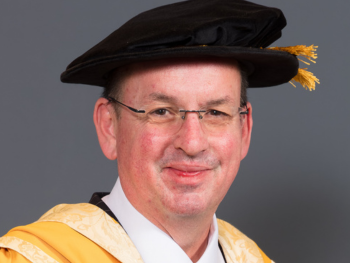University News Last updated 10 January 2024

Defending death-row inmates in Oklahoma convinced a young Sir Julian Knowles that his future lay in the law - but the British High Court Judge admits he sometimes had to “pinch” himself during an illustrious career that included some of the most high-profile cases ever seen.
“It was an astonishingly formative experience to have aged 21,” said Sir Julian of his time as a volunteer paralegal working with condemned prisoners in the United States. “I worked with some great people and saw some terrible things, but I soon realised that law was what I wanted to do.”
Sir Julian recently returned to Birmingham City University (BCU) to receive an Honorary Doctorate in recognition of his outstanding contribution to public and professional life.
“It is a privilege to be recognised,” he said. “The University has turned out thousands of amazing graduates over the years and to receive this honour feels very special. I like to think I am accepting it on behalf of everyone who has gone there and worked hard in pursuit of their dream.”
Sir Julian studied Maths as an undergraduate at Oxford University and had plans to move into research. Instead, he chose to study law and graduated with distinction from BCU in 1993.
“I realised I wanted a career that would enable me to do something useful and help society,” he said. “I owe my career as a lawyer to BCU and the brilliant lecturers I had. I can honestly say I enjoyed every day there and I look back on my time there with great affection.”
After leaving BCU, Sir Julian embarked on a career that resulted in his involvement in some of the biggest legal battles in UK history.
These included the General Pinochet extradition case, the Siôn Jenkins murder case, the Kenneth Noye M25 murder, the shooting of Jean Charles De Menezes, the Dewani ‘honeymoon murder’ extradition case, and the Queen’s Lancashire Regiment war crimes court martial.
“The Pinochet extradition case in 1998 was an important case which broke new legal ground,” said Sir Julian, who was on the team opposing the former Chilean leader’s extradition from the UK.
“It was a great case to be in at the start of my career. I loved trying to help solve the really difficult legal problems it threw up. And I got to see some of the most brilliant advocates ever at the peak of their powers. That was an immense privilege and helped my own growth as a lawyer.
“My last case in the Supreme Court - R v Jogee - reformed 30 years of the law of murder and was the culmination of a problem which I had been puzzling over all my career.”
So how would Sir Julian, who was awarded the customary knighthood on his appointment to the High Court Bench in 2017, reflect on his career?
”As a barrister, I worked hard but was also amazingly lucky with the opportunities I had,” he said.
“I tried to take every one of them with both hands and do the best I could in accordance with my professional duty. That’s all anyone can do as a barrister.
“As a judge, I come to every case with an open mind and make decisions in accordance with the law as I see it. What I did as a barrister – or a student - is just no longer relevant. Integrity and impartiality and courtesy and fairness is at the core of what we do.”
And what advice would Sir Julian, who was renowned as a barrister for his practice in complex criminal law and fraud, extradition, human rights law, public law and media law, give to anyone considering a career in the legal profession?
“It is a great career that can be immensely rewarding, but it is very competitive, so you need to go into it with your eyes open and have a strategy,” he said.
“Also be aware of the responsibilities you will have. They are immense.”